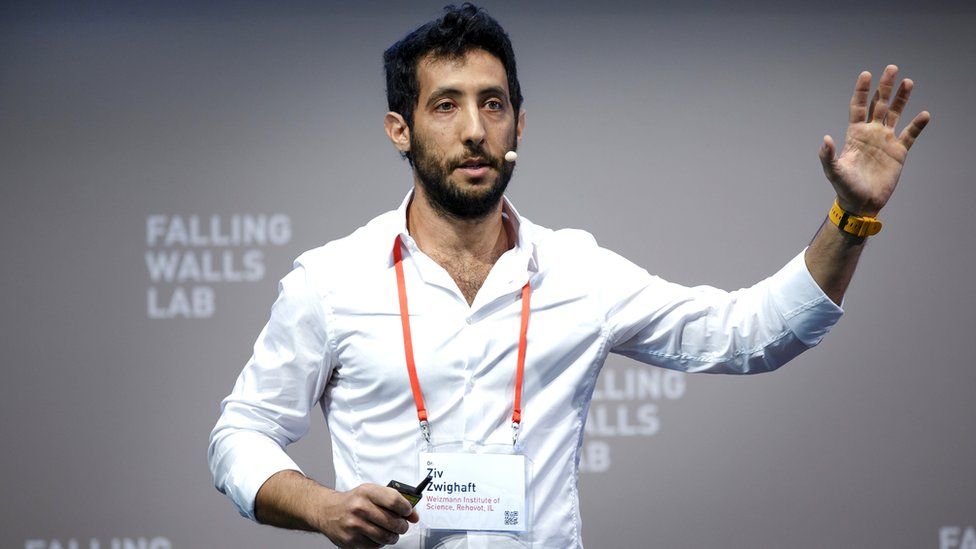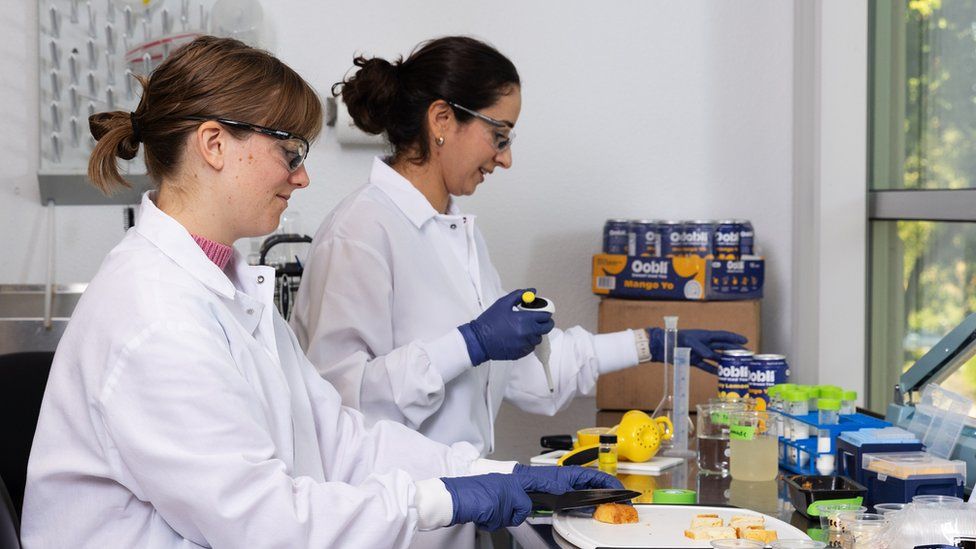
“We believe it is the holy grail of sugar replacement,” says Ziv Zwighaft of a white granulated powder called allulose.
Allulose is about 70% as sweet as sugar, but is very low calorie and has a negligible impact on blood sugar levels, an effect measured by the glycemic index.
Allulose is found naturally in tiny quantities, for example in figs and raisins.
First approved for use in the US over a decade ago, the so called “rare sugar” is commercially produced from fructose.
But while it is widely regarded as an excellent all-round sugar replacer, similar in both taste and function, it is niche because production is expensive.
Dr Zwighaft’s Israeli based startup, Ambrosia Bio has a dramatically cheaper way of making it with a proprietary enzyme (produced by a genetically modified microorganism), and which uses either sugar or high-fructose corn syrup as the raw material.
By partnering with sugar producers, Dr Zwighaft hopes to take allulose mainstream.

With rates of obesity and diabetes skyrocketing, consumers are looking for better, healthier sugar alternatives. An array of food tech start-ups is trying to deliver them for large food companies to incorporate into their products.
“The global sugar substitute industry is on a definite upward trajectory,” notes Gaurav Sahni, an analyst at innovation consulting firm GreyB.
He adds that governments are contributing to the trend with measures including sugar taxes.
GreyB projects the global sugar substitute market, worth around $17bn (£14bn) today, will be worth more than $28bn (£23bn) in a decade’s time.
Plenty of replacements exist already. There are older artificial sweeteners like aspartame, saccharin and sucralose – typically used in diet drinks – and newer natural sweeteners such as stevia and monk fruit extracted from plants (the latter isn’t yet approved as a food item in the UK or EU). Many times sweeter than sugar, they require only tiny amounts.
There are also polyols or sugar alcohols – erythritol particularly has gained traction in recent years.
Naturally occurring but produced commercially from sugar and starch, they aren’t as sweet as sugar but have the right amount of bulk for making baked goods and other processed food.

Yet the alternatives fall short, say experts. Aftertaste and mouth-feel can be problematic.
Sugar also plays an important part in texture, browning colour and shelf-life – roles that the alternatives can fail to fill.
“Sugar does a lot more than sweeten,” says Mervyn de Souza, senior director at US biotech firm Ginkgo Bioworks, who tracks the sector.
There are also potential safety concerns – and they extend beyond the laxative effects that high consumption of polyols can produce.
Erythritol has been linked to strokes and heart attacks (though others say that conclusion is premature).
Aspartame has been designated as “possibly carcinogenic” by World Health Organisation (WHO) cancer experts (though a separate WHO body affirmed it safe within current intake guidelines).
In May, the WHO made a general recommendation against the use of non-sugar sweeteners to control weight, adding they may also increase the risk of diabetes and cardiovascular disease (it reviewed evidence for many established products including stevia, but didn’t consider monk fruit, erythritol or allulose).
The start-ups see room for improvement.
Ambrosia Bio isn’t alone in trying to bring forth affordable rare sugar. In January US-based startup Bonumose, with the assistance of ASR Group, the world’s largest refiner of cane sugar, opened a new plant to produce another – tagatose – also at lower cost.
It too is considered an excellent all-round sugar replacer, even pipping allulose with 90% of the sweetness. “It matches even more closely,” says Ed Rogers, Bonumose’s chief executive.
Other new bulking sweeteners are emerging too. In the UK, The Supplant Company has developed a low calorie, low glycemic response product which is mildly sweet. Supplant produces it from agricultural waste, including cobs, husks, stems and stalks, using enzymes found in fungi.
It is functionally like sugar and the raw ingredient is abundant, cheap and environmentally sustainable, says chief executive Dr Tom Simmons.
Another Israeli start-up, Incredo, embeds sugar crystals with the inert mineral silica (sand), which is commonly used in small amounts in food, for example as an anti-caking agent.
Physically modified in this way effectively makes the sugar sweeter: it dissolves more easily in the mouth, so less is required for the same taste. Incredo’s customers include US bulk chocolate manufacturer Blommer.
Meanwhile, so called sweet proteins – thousands of times sweeter than sugar, and which occur naturally in some equatorial fruits and berries – offer a tastier high intensity sweetener say their proponents.

US-based start-up Oobli produces sweet proteins by fermenting sugar using genetically modified yeast.
“Sweet proteins absolutely work in sodas,” says Ali Wing, Oobli’s chief executive.
Yet the start-up companies face hurdles.
One can be finding customers. It can take a few years for the large manufacturers to reformulate a product using a new ingredient. The start-ups also need to demonstrate they can produce their alternatives reliably and at scale.
There can also be hesitancy amongst shoppers about trying new products.


Getting regulatory approval for new ingredients can be difficult too. While most have US approval through Generally Recognized As Safe (GRAS) designations, approval is more onerous in Europe.
Allulose isn’t currently approved in the UK or EU, though a consortium of companies is trying to change that. The Supplant Company is currently preparing dossiers to submit its product to UK and EU regulators.
Tagatose, meanwhile, has long been approved in the US, UK and EU.
But marketing it may be hard: it isn’t permitted to be described as “zero sugar” the way allulose is because it has slightly more calories than allulose.
It is exciting to see new sugar alternatives emerging says Kimber Stanhope, a research nutrition biologist at the University of California, Davis. The best solution is to cut out sugar, but it can be difficult. “We do need these products,” she says.
Dr Shanhope believes, contrary to the WHO’s recommendation, non-sugar sweeteners can be helpful in controlling weight and reducing diabetes risk. She points out that the WHO based its recommendation on only one type of study.
But she also notes each new product will need to be carefully evaluated both for safety and for potential benefit. “We need clinical trials,” she says.
Related Topics
Read More: World News | Entertainment News | Celeb News









